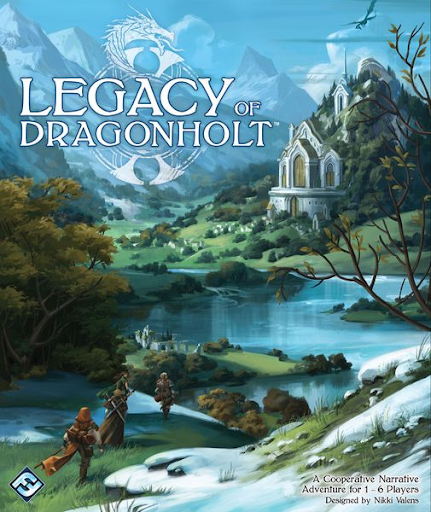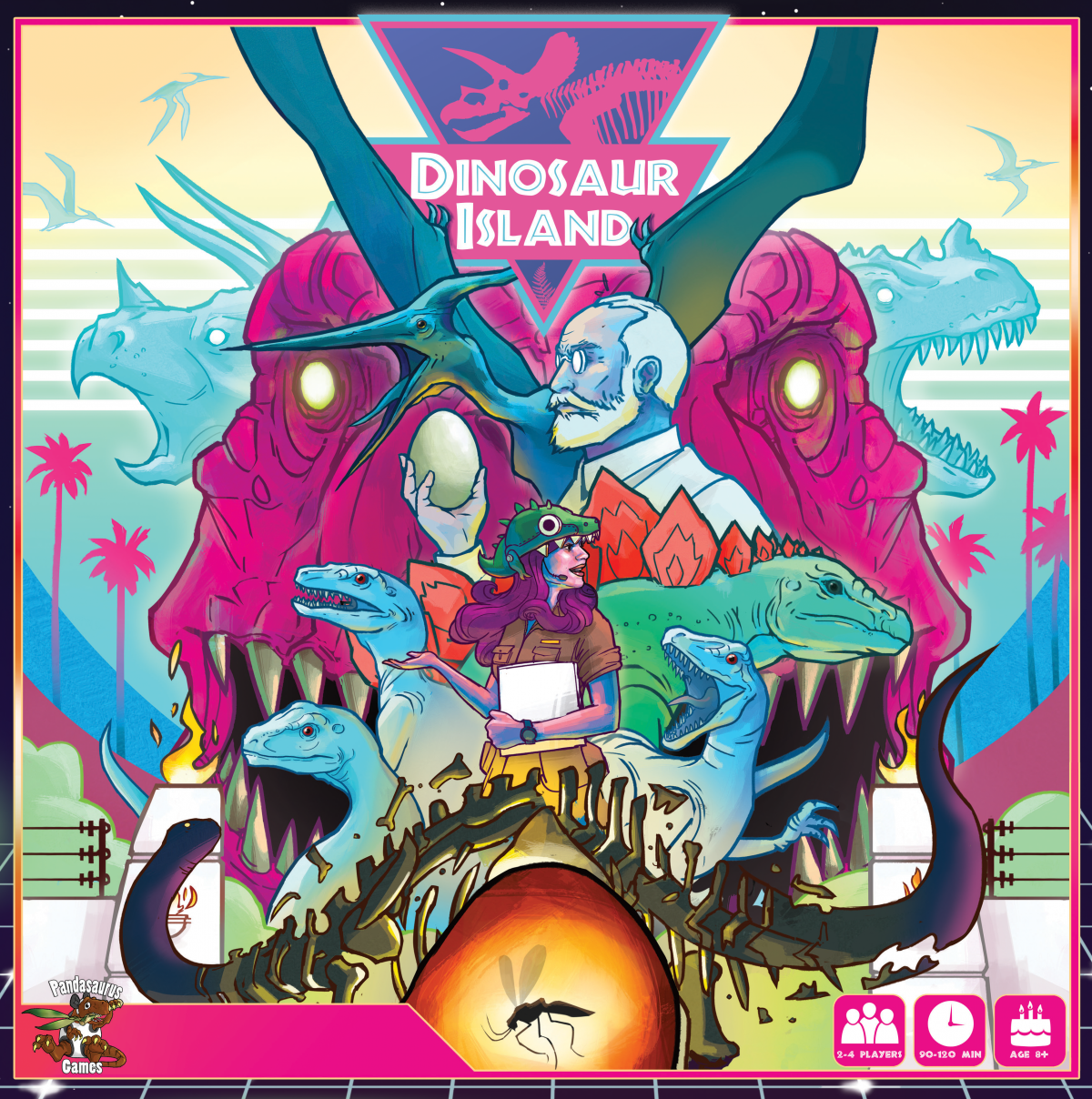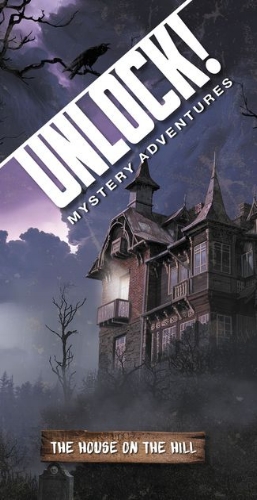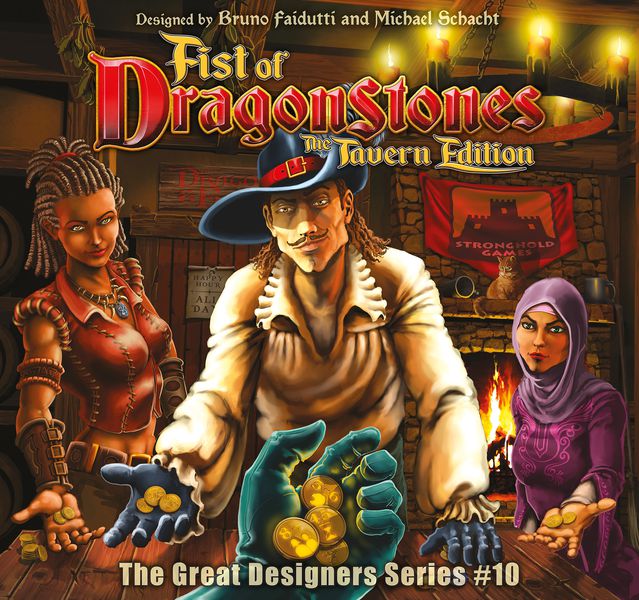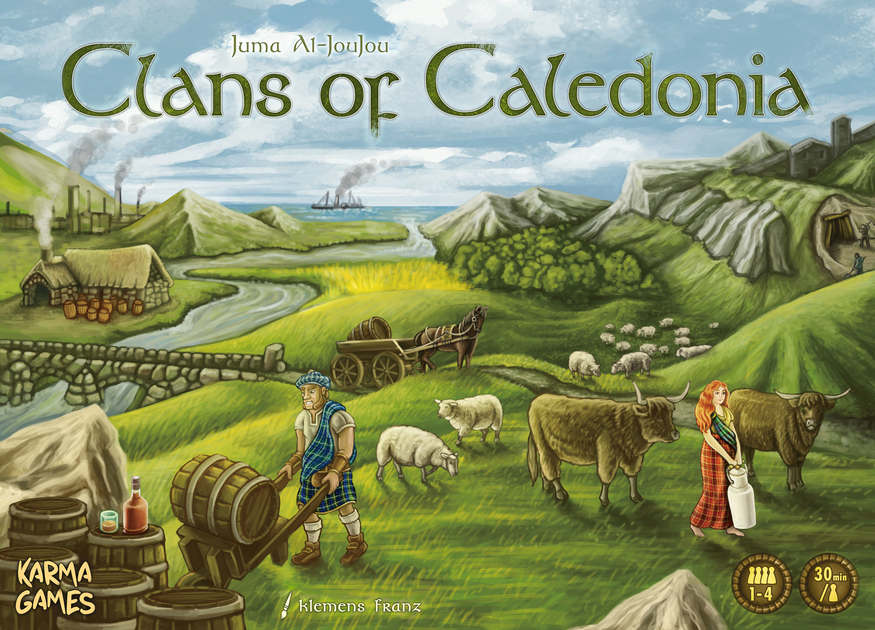Legacy of Dragonholt
Published by Fantasy Flight Games - 2017
Designers: Nikki Valens, Daniel Clark, Tim Flanders, Annie Mitsoda, Greg Spyridis
Head Artists: Alex Aparin, Jacob Atienza, Jared Blando, Anna Christenson, Amanda Duarte, David Griffith, Jamie Martinez, Sandara Tang Sin Yun
1 - 6 players ~ 60 - 90 minutes per session, 8 sessions
Review “Pages In Pursuit of Progress” written by Luke Muench
I find myself often neglecting the importance of story in board games. Every board game tells a winding tale of some sort, whether it’s that moment when the traitor reveals themselves, or that power play where your friend takes 5 actions that all chain together into an orchestra of success, or even that time when you forgot your plan mid-game and floundered to figure out what you’re doing. These are the moments that make games memorable, for as mechanically sound as any experience can be, if there’s nothing worth recalling about your time with it, it’s unlikely you’ll put it to the table again.
In this way, Legacy of Dragonholt, being a choose-your-own-adventure style board game, looks to create those moments for you, but in a more controlled, pre-constructed environment built to make you experience a certain emotional progression, with all the traditional aspects of your average fantasy tale, both the good and bad.
On Your Bookmark… Get Set…
As the name suggests, this epic storytelling affair is something of a pseudo-legacy experience, in that you are told a narrative that you will unlikely be able to revisit due to already knowing all the twists and turns that are coming. No, you aren’t destroying components or anything, and I have known others to play through multiple times, but in my experience, there is little to no reason to turn back.
In many ways, this can make your time in Dragonholt feel special; your choices have more weight to them, and your senses are heightened as you try and observe everything you can to deduce the mysteries each page threatens to hold. Is it worth checking behind that bush, or might we press on to more important things? Should we try befriending that local Smithy, or is our time better-spent training at the Guard Station?
When first encountering the city of Dragonholt at the end of your first session, you’ll have the opportunity to open the sprawling map of the land, covered in locations for you to scour through, trigger events, discover trinkets, and just enjoy the pastoral story at work. Many of the choices made page to page are just as much about the story being told as it is trying to improve your chances to conquer whatever obstacles lie ahead.
Time is of the Essence
Each of your 8 sessions with Legacy of Dragonholt will be paced using a time mechanic. When you go to a location and are able to start an event that gains your an item, money, an opportunity, or more in-depth story moment, a “time” passes. When enough time has passed, the day is over and the story provides you with an opportunity end your play session and put away the game until next time.
There are 7 books for you to discover and travel through, with the Dragonholt book being by far the heaviest and most often passed through. The other 6 feature dungeon-like quests that will test your characters’ skills and know-how as you attempt to scale rocky cliffs, find ancient tombs, or even battle a dragon. While most of this will automatically trigger on certain days, some are completely optional and skippable; in my playthrough, 1 of these books went untouched, which felt oddly gratifying. I didn’t do the right things to encounter that particular quest, and so I never had the chance to engage with it, and that’s more than okay, great in some aspects. Sure, I looked up how I would have opened said door after the fact, but knowing that there is content out there special to those who managed to find their way is a neat and exciting feeling that makes my playthrough feel just as special as anyone else’s.
Speaking of choices, Dragonholt offers the opportunity for up to 6 players to collectively make choices in the story at hand. This is waaaaaaaaaay too many people. Like, insane. I’m not sure how it could be suggested, lest as some sinister marketing decision, but much of the book is written to be one person playing through the game, though I adventured with one companion. BGG suggests 3 players at the most, and I would have to agree that any more than that would get out of hand.
Each page, while being covered with lengthy descriptions and conversations, are punctuated by highlighted choices that only 1 player at the table can make. If you’re plaything through solo, this is obviously no problem, but for those of us who would rather have friends by our sides, there is a brilliant sharing system in place. When a player would like to weigh in a choose a specific event, they flip their token, declaring their intent when marching forth. Their token then remains used until all players have had the chance to make a choice, refreshing everyone's’ tokens afterwards.
Choices will often be limited by the skills or abilities your character has, and sometimes by the equipment your team has acquired. This can lead to some frustrating moments where the magic caster is exhausted and we could reeeeeeeeeeeally use a frostbolt right now dude, so maybe if you could just chug an energy drink and help us out, that’d be swell. As the game presses on, though, this becomes less and less of a pressing issue, as characters will occasionally get more skills via XP. It grows clearer and clearer that your decisions don’t have too much weight in the grand scheme of things, mechanically or narratively.
A Forgiving Path
Being a narrative-based story in which players can make lots of choices over the course of multiple sessions, very few moments of true weight or impact are imparted on the players, with many of the necessary story points locked away to certain time slots that cannot be avoided. Similarly, those side quests you do stumble upon give you optional items and a brief glimpse into the undeveloped world of fantasy jargon at play. There’s an illusion of a world here, to be sure, a pale, unsatisfying iteration of your typical Middle Earth clone, but by the end, much of it reduced to unmemorable fantasy pageantry, passing through your ears seamlessly until the next prompt appears.
That’s not to say there aren’t some incredibly rewarding moments, usually some narrative moment off the beaten path, adding a sense of agency and discovery. In my playthrough, we came across a mystic item of power that, sure enough, ended up being an applicable trigger for certain choices, and I went out of my way to use it every chance I had, whether it was a good idea or not. I had this cool thing that I discovered and was now contributing and challenging the world at large. Similarly, some of the more fleshed-out characters have deeper backstories that you can dig into if you choose, learning more about their personal lives and becoming closer with them as each day progresses.
Unfortunately, most of these don’t have “ends” to speak of, trailing off in the background while the main plot grabs your hand and drags you down the corridor you need to follow, because “plot”. It’s jarring, annoying, and made me feel like a child being told what I needed to do rather than being shown what I could do, and left a sour taste in my mouth when all was said and done.
This might be more forgivable if the writing wasn’t as ham-fisted, and as it is, and while there is some charm to that endeared me to the game, it also leads to “mysteries” that you are outright told the answers to rather than having your detective skills play any part in your ability to continue. If anything, I started to deduce what choices my character should or should not take based on how it was framed, predicting the skills I might need to not take damage.
Not that taking damage is a big deal. It is basically impossible for our character to die, both mechanically and from a story perspective. Sure, your health can be reduced to 0, but that just disables one of your 6+ skills, leaving you battered but by no means out of the fight. And the frequency of this even being a problem is very rare unless you are choosing obviously silly or foolish options just to see what might happen.
Lastly, while your character is someone you created at the start of the game, other than what skills you choose to equip at the start, your persona means absolutely nothing in the grand scheme of things. Dragonholt can, for all its charm and whimsy, feel impersonal, ignoring any character work you bothered to do at the start, not that your options are terribly robust.
Worth the Journey
Legacy of Dragonholt is a mixed bag, but a unique one, filled with enough fun and exciting reveals and adventures that it’s worth your time and money, assuming you enjoying reading tons of text. It won’t challenge you, either as a game or a story, and while the concept of a choose your own adventure as a game feels innovative here, it does little to set itself apart from other fantasy settings. So, if you are looking for a challenging game or empowering narrative, somewhere on either end of strategy or role playing, Dragonholt likely will not satisfy; but maybe, just maybe, you are looking for something in between. This game is a campaign long amusement ride through a fantasy land. You may not be able to go off the tracks, but you can throw some switches to explore paths unseen, and if you are looking for a casual and creative way to enjoy a story, then Legacy of Dragonholt may be just the thing.
Who Should Get This Game: Anyone looking for a light storytelling experience with the illusion of agency and the presence of orcs and dragons.
Who Shouldn’t Get This Game: If you hate reading or want nothing more than to max your stats to take on any foe, you can pass this one by
Other Recent Reviews

